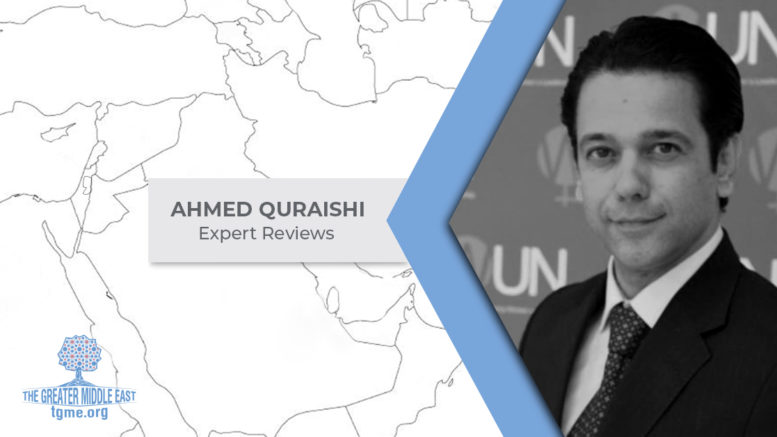A threat of a military conflict between the region’s two largest countries – Iran and Saudi Arabia remains in the Middle East, in particular in the Arabian Gulf.
Imran Khan, the Prime-Minister of Pakistan, said the following in his recent interview: “We are trying our best to make sure that ties between these two countries do not deteriorate.”
We asked Ahmed Quraishi, journalist, public policy writer, researcher and television commentator on security & foreign policy, to comment on the position of Pakistani officials and society on these issues.
In his interview, Mr.Khan was quite reticent, talking about the possible military confrontation between Iran and Saudi Arabia. In your opinion, in case of a military conflict, can Pakistan remain neutral?
Since the 1979 regime-change in Iran, which overthrew Pakistan’s longtime ally, the shah, Islamabad adopted a policy of helping the new rulers of Iran, the mullahs, in their foreign policy troubles. Pakistan would always extend a helping hand, mediate, and, at worst, become neutral in any difficulty that Tehran faced on foreign-policy front. Pakistan consistently pursued this policy over the past forty-one years regardless of how bad Iran’s regional and international behavior and strategies had become. This is quite remarkable considering that Islamabad overlooked many Iranian transgressions on Pakistani interests, including the policies of the Islamic Revolutionary Guards Corps, the IRGC, in Afghanistan, and the military and intelligence cooperation with India, Pakistan’s archrival, which directly impacted Pakistani national security. Pakistan did this to ingratiate itself with Iran’s new rulers, and to avoid the wrath of Iranian mullahs in terms of exporting the revolution and unwanted attention by the IRGC. In this context, the policies of Prime Minister Imran Khan are not a new, despite Mr. Khan’s attempts to cast this as a policy innovation. His recent mediation efforts were valuable by way of helping delay escalation between Iran and the United States and Saudi Arabia, separately. But there is no indication this mediation helped in resolving the conflict and preventing the endless cycles of escalation and de-escalation. In case a war erupts between Tehran and Riyadh or Washington, Pakistan will find it difficult to sustain the balancing act, though it’s not impossible [Pakistan did it during the eight-year Iran-Iraq war in the 1980s.] Islamabad is heavily dependent on Gulf Arab oil and gas, from Saudi Arabia, Kuwait, and Qatar. Gulf Arab states host the largest Pakistani diaspora in the world. Their annual remittances constitute the single most significant contribution to Pakistani foreign exchange reserves. Pakistan’s ties with the United States are vital for both nations, and the Pakistani economic, social, political, and military interdependencies with Gulf Arab states and the United States are profound and multifaceted. During the tensions that followed Washington’s decision to take out IRGC’s Qasem Soleimani in Iraq, American diplomats and military officials maintained close exchanges with Pakistani counterparts as part of Washington’s consultations with allies in the region. How will Pakistan balance these interdependencies in case of an escalation in the Iran crisis, and whether Islamabad will continue to bail out Tehran in its foreign policy mess, remain to be seen?
We know the position of Pakistan’s Prime-Minister. What about the position of Pakistani society? Does society remain neutral as well, in general? Or are there any sympathies for one of the sides?
The Pakistani society has become deeply divided since two events that happened in 1979: the Iranian regime change and the Soviet invasion of Afghanistan. During the 1980s, several Mideastern states cultivated political proxies inside Pakistan, including Libya, Iraq, Syria, and Iran. Separately, the United States, Gulf states, and the Pakistani government backed the mujahideen fighting Soviet communism. In many ways, Pakistani society remains beholden to the 1970s and 1980s era of religious and nationalist populism that swept the Middle East. Iran is mostly seen in Pakistani society in emotional terms as the last bastion of anti-Americanism, anti-West, and anti-modernism. Many Pakistani Sunni and Shia extremists have sympathies with Iran’s mullahs. Most Pakistanis are not aware that Tehran considerably improved its relations with the West during the Obama administration, or that use of sectarianism and extremism is part of Iran’s policy discourse across the region and that this negatively impacts broader Pakistani regional interests.
Moreover, thanks to residual extremism in Pakistani society due to the two seminal events in 1979 in Iran and Afghanistan, foreign policy discussions in Pakistan, even among the educated elite, remain mired in religious fervor, extremism, or secular leftist populism. In Iran, many Pakistanis are unable to conduct a professional strategic analysis of Iranian foreign policy without invoking religion and sect. Most Pakistani discussions on Iranian policy end up becoming shouting matches between Sunni and Shia extremists, preventing Pakistani public opinion from dispassionately analyzing Iran’s place in the region and its relations with Pakistan and its impact on Pakistani strategic interests.



Be the first to comment at "Ahmed Quraishi: Iran is mostly seen in Pakistani society in emotional terms as the last bastion of anti-Americanism, anti-West, and anti-modernism"